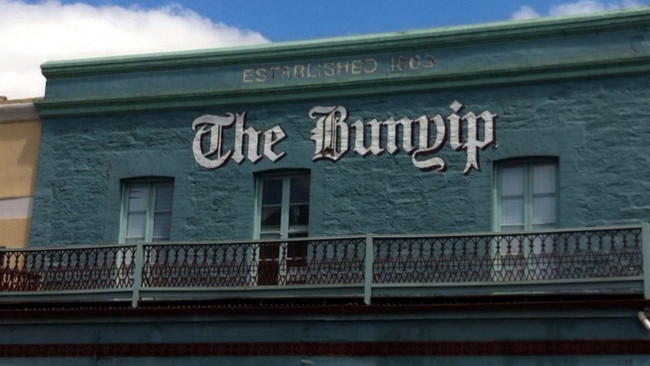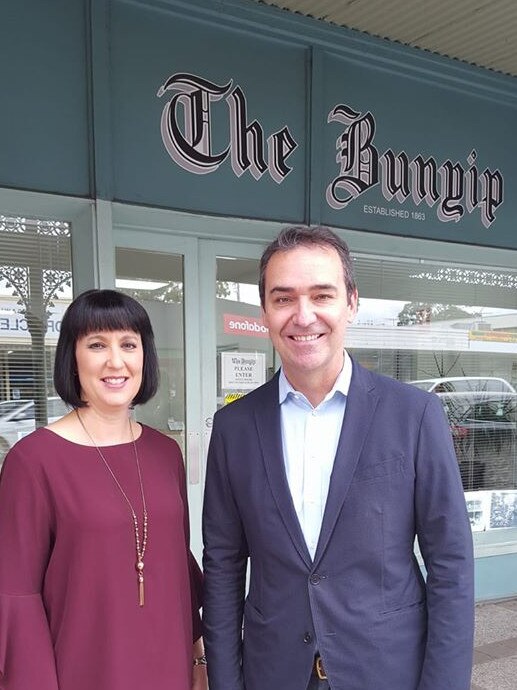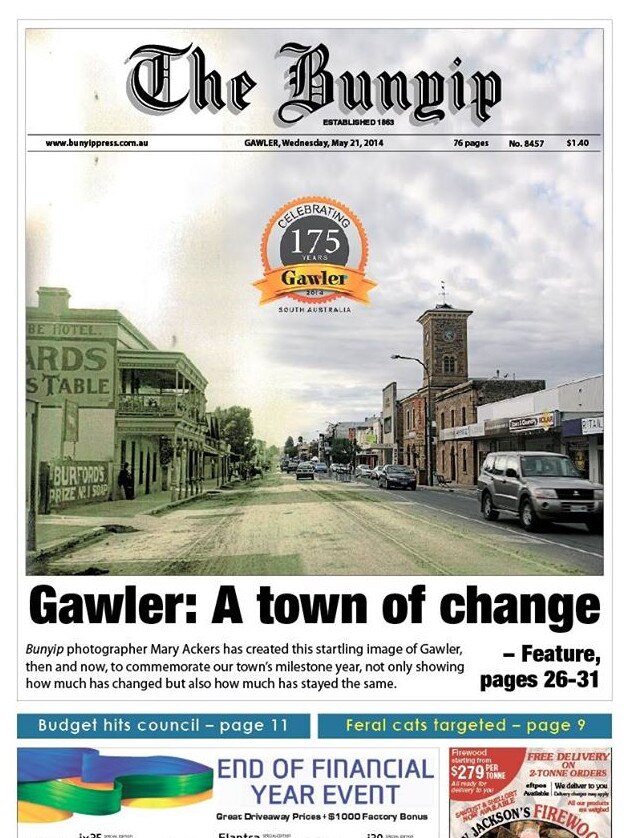Gawler’s historic newspaper The Bunyip closes indefinitely amid coronavirus pandemic after 157 years of operation
The closure of one of SA’s oldest newspapers has sent shockwaves through Gawler. The Bunyip’s former editor, Grady Hudd, says the community must rally to ensure the paper reopens once the COVID-19 crisis ends.

North & North East
Don't miss out on the headlines from North & North East. Followed categories will be added to My News.
- The Messenger suspends print editions but will continue online
- How to get the most out of your Advertiser digital subscription
In 2014, I walked through the front door of The Bunyip in Gawler as a wide-eyed young journalist ready to take on the world.
Coming from a small publication in Western Victoria, where I had my first industry job, I couldn’t believe my luck when I ventured into the newsroom and was greeted by seven editorial staff, including my editor.
This is amazing, I thought to myself. It was a workplace buzzing with excitement, better than I could have imagined. This is where I would truly forge my start as a journalist.
And I was right.
Over the course of the next five-and-a-half years I worked with some of the most incredible people, in the editorial, advertising, production and administration departments, who were all dedicated to one thing – putting out the best newspaper possible each week to inform, educate and entertain the Gawler community.

To hold all levels of government to account, to report on the strong local football, netball, and other sporting leagues in the area, to tell stories of human triumph and tragedy.
Staff came and went over the journey, as in any workplace, but the dedication to the craft, the pursuit of excellence from those at The Bunyip was unwavering.
It is why I am left gutted, heartbroken and also angry that after 157 years as Gawler’s newspaper, as of today The Bunyip has closed its doors indefinitely.
Gutted because in a time where accurate, credible, localised reporting is needed more than ever – to cut through the ‘fake news’ that has riddled social media and infiltrated daily life – the Gawler community now has to look elsewhere for information that it will likely not find anywhere else.
Heartbroken because I know how passionate and proud each Bunyip staff member is of the work they do, and who are now left without work during an unprecedented, uncertain time due to the coronavirus pandemic.
And angry because it has gotten to this point.
Over the past week, regional and community journalism has been rocked to its core by the closure of some of its longstanding mastheads.
In Adelaide, the free Messenger print editions are being put on hiatus until May due to the collapse in advertising revenue, although Messenger stories will continue to be published digitally on Advertiser.com.au and their local sites.
The Sunraysia Daily in Mildura, which was celebrating its centenary this year, stopped the presses indefinitely, while Broken Hill’s Barrier Daily Truth, founded in 1897, has also closed its doors until the coronavirus crisis ends.
By comparison, The Bunyip had been printing newspapers in Gawler for at least 30 years before that, reflecting just how significant its closure is.
Sadly, as the COVID-19 pandemic sweeps across the country, businesses have been hardest hit and as a result, advertising revenue from those businesses has dried up for many regional publications.
Ben Taylor, managing director of the Taylor Group of Newspapers – which owns The Bunyip, and four other mastheads in the Riverland – said as much when announcing, on the front page, The Bunyip would close indefinitely.
“Regional newspapers through Country Press SA and also our national association Country Press Australia, have been lobbying governments for many years to support our industry,” he wrote.


“This has fallen on deaf ears as governments continue to shift their ad spend to online platforms.
“We are the medium relied upon to generate public discourse and debate to ensure decision makers are accountable.
“We are the medium expected to publish the government’s media releases of their good deeds, stories of expenditure on vast public works and grant funding, yet we receive less and less of the government’s spending each year.”
“This historic region, like all regional centres, deserves its masthead … to provide the first draft of the history of Gawler and surrounds.”
But just as the desertion of advertisers has been hastened by coronavirus, the attitude and expectations of what I like to think are a loud and vocal minority have disappointed for a long time.
While editor at The Bunyip, a position I held during the final three years of my tenure, our business Facebook page would be littered with complaints from people demanding to know why stories weren’t ‘free to read’.
There was an expectation from these people that news should be come at no cost, and that it was ‘their right to know’ what was happening around Gawler.

This was despite the price of a single coffee giving them access to a month’s worth of content.
Stories that had been sourced, written and published by The Bunyip’s hardworking team, all who – like the rest of the community – have bills to pay, and families to provide for.
I can only hope the shock of this closure will jolt the Gawler community to its senses because if The Bunyip is to reopen once the threat of coronavirus has subsided, it needs support from readers.
Just as every other regional masthead across the state needs similar backing from its communities.
What many people may not know is that all those years ago, The Bunyip started out as a satirical publication known as the ‘Gawler Humbug Society’s Chronicle’, before its first official newspaper was printed in 1863.
It is with a degree of irony that 157 years later, it closes its doors on April Fool’s Day.
But this is no joke, nor is it a laughing matter. It is anything but.
The very foundation upon which Gawler – the oldest country town in the state – has built its welcoming and wonderful community on has been rocked to its core.
This is a sad day for journalism, but hopefully one that can be overcome once the coronavirus pandemic ends.
Communities need their local newspapers, and Gawler needs The Bunyip.
